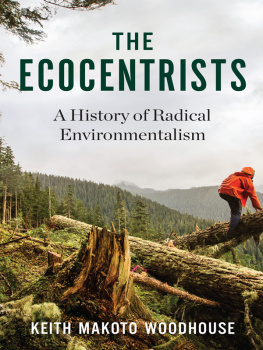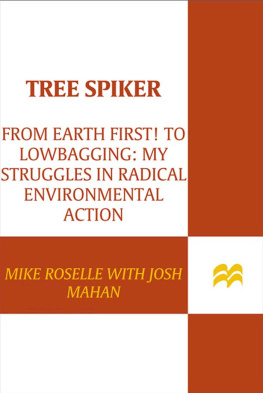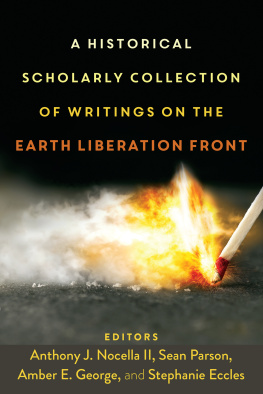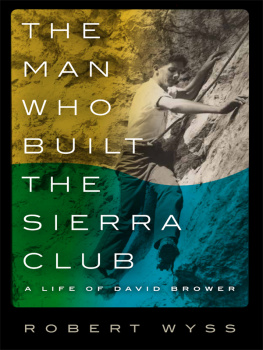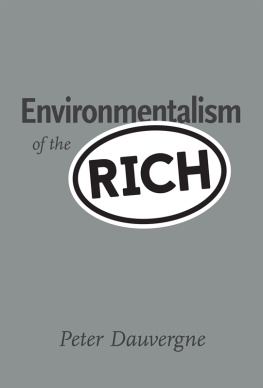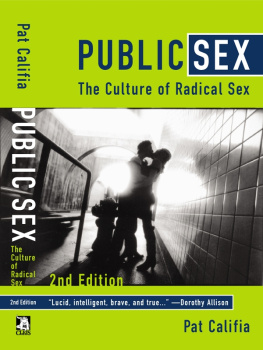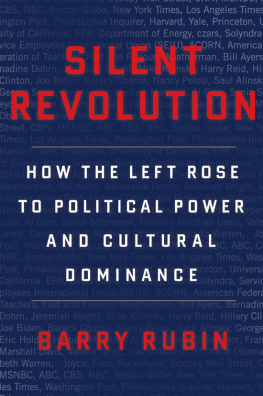Table of Contents
The Ecocentrists
The Ecocentrists
A History of Radical Environmentalism
Keith Makoto Woodhouse
Columbia University Press New York
Columbia University Press
Publishers Since 1893
New York Chichester, West Sussex
cup.columbia.edu
Copyright 2018 Columbia University Press
All rights reserved
E-ISBN 978-0-231-54715-4
Cataloging-in-Publication Data available from the Library of Congress
ISBN 978-0-231-16588-4 (cloth)
ISBN 978-0-231-54715-4 (e-book)
A Columbia University Press E-book.
CUP would be pleased to hear about your reading experience with this e-book at .
Cover design: Julia Kushnirsky
Cover photograph: Richard Schultz
Contents
The year before I began graduate school, I spent a summer as a Forest Service ranger in the Weminuche Wilderness, a half-million acres straddling the Continental Divide in southwestern Colorado. I hiked dozens of miles each week, checking backcountry conditions and making visitor contacts. Other rangers enforced Forest Service regulations by issuing citations. Still others sat at desks in Creede, Durango, or Pagosa Springs, overseeing the administrative work of wilderness management according to guidelines set by foresters in Golden, Colorado or Washington, D.C. Even my brief and limited view of the Weminuche made clear how much human effort went into keeping this piece of the country wild.
The trail crews best demonstrated this incongruity. Winter in the mountains of Colorado brought blowdown: wind-felled trees that often obstructed hiking trails. In the spring and throughout the summer, trail crews cut through the dead trees to clear a path. In the forest at large the crews used all-terrain vehicles and chainsaws. As soon as they reached a wilderness boundary, they abandoned their motorized equipment, saddled horses and mules, and continued up the trail with handsaws and axes. Cutting through a downed tree with a handsaw is strenuous work; what might take minutes with a chainsaw can take over an hour without one. The Forest Services commitment to using livestock and hand tools inside wilderness was both noble and odd. Thanks largely to a very human political process, the forest on one side of an administrative boundary was subject to roaring chainsaws and motor exhaust and on the other side free from both.
That summer I read William Cronons The Trouble With Wilderness, an essay that had sparked an ongoing debate among academics and environmentalists. The Trouble With Wilderness describes the paradox that I encountered high in the Rockies: wilderness is both defined by human absence and also quite profoundly a human creation, a creation shaped by administrative policies that are themselves the product of deeply rooted assumptions. Even when wilderness is thousands of miles away and almost never visitedin fact, especially thenit remains culturally and socially situated. The lone hiker escaping into a nature devoid of human influence is beguiled, stirred by a set of preconceptions packed in along with water and sunscreen.
Like many readers, I found the essay as disconcerting as it was compelling. Even more nettlesome than the idea of wilderness as artifice was the claim that just as human influence streams into wilderness, so artifice trickles out. Wilderness, Cronon writes, serves as the unexamined foundation on which so many of the quasi-religious values of modern environmentalism rest. The idea of wilderness sits within and informs a larger idea called nature, which in turn frames the political movement called environmentalism. That movements critiques often assume that people have wandered away from nature-as-it-should-be. As the ultimate landscape of authenticity, wilderness offers a baseline against which to measure how far the human world has strayed. If wilderness is a false beacon, then the environmental movement as a whole may be misled.
This smudging erased more than an imagined boundary between boulevards and fields. Cronons own Natures Metropolis, in demonstrating the inextricable connections between a city and its hinterland, commingled geography with philosophy as easily as it did Chicago with the plains beyond. Cronon described his deepest intellectual agenda as not simply to remove lines on a mental map but to suggest that the boundary between human and nonhuman, natural and unnatural, is profoundly problematic. Part of the cultural turn in environmental history was a willingness to question the category of nature itself.
The cultural turn had deep implications for environmental history as well as for environmentalism. The implications for environmental history were overwhelmingly salutary. First and foremost, the cultural turn led to a welcome reconsideration of timeworn narratives. An untethering of the field from its most familiar renderings of nature produced innovative scholarship that corrected myopic views. Long-cherished subjects, like the conservation movement, received a newly critical treatment. Historians began to describe how conservationists fixation on an unpeopled nature allowed them to disregard the established practicesand sometimes even the existenceof already marginalized groups, privileging recreation and sightseeing over subsistence hunting or Native American treaty rights. The decentering of wilderness as an idea, meanwhile, reflected the decentering of wilderness as a place. Historians found in cities and suburbs stories about how people related to the natural world, and even about the origins of the environmental movement. Since the cultural turn, environmental historians have better resisted narrow assumptions about how people understood and used natural resources, and have avoided too-easy morality tales about the innocence of nature and the danger of human influence.
It is easy to understand why not. Metanarratives of decline are less compelling when the idea of nature is less stable. Scholars have argued forcefully that a too-fixed definition of natureand maybe even more importantly of the word naturalleads to exclusionary systems and practices, and to essentialisms that can be used to marginalize people as much as to explain the nonhuman. The concept nature has served to calcify and delimit as much as to enlighten, and so its meaning has to remain fluid and subject to reinterpretation.
What does this mean for environmentalism, a movement that is in many ways predicated on a nature that exists, at least in part, beyond human conceptions of it? As a graduate student I tried to think about that question by examining a group of environmentalists who proclaimed, more than any others, that nature held meaning and value regardless of what people thought, and who insisted that a felled tree made a sound and subtly altered a forest whether or not people heard the crash or understood its ecological implications. These radical environmentalists wanted above all to challenge human preeminence. They argued that people were no more important than any other living things on the planet or than the ecosystems those things inhabited. They claimed, ultimately, that human beings and human society held no greater moral value than did nonhuman species and ecological systems, a philosophy called ecocentrism.
It is easy to dismiss such extreme ideas. They lead in many troubling directions. Chief among them is the way in which the idea of an autonomous nature reinforces one of environmentalisms most problematic impulses: the tendency to group all people into a single, homogenous category called human, a tendency Cronon has criticized as an oversimplified holism. Environmental holism risks ignoring social and cultural difference and suggesting that all people are equally culpable in modern civilizations effects on the natural world despite unequal distribution of resources and vast inequities of economic and political power. Environmentalists have often criticized humanity in the singular without recognizing the unending diversity to which that term refers.

